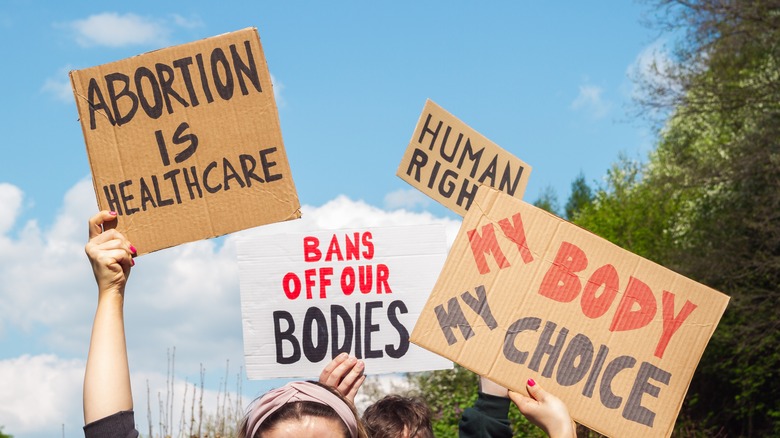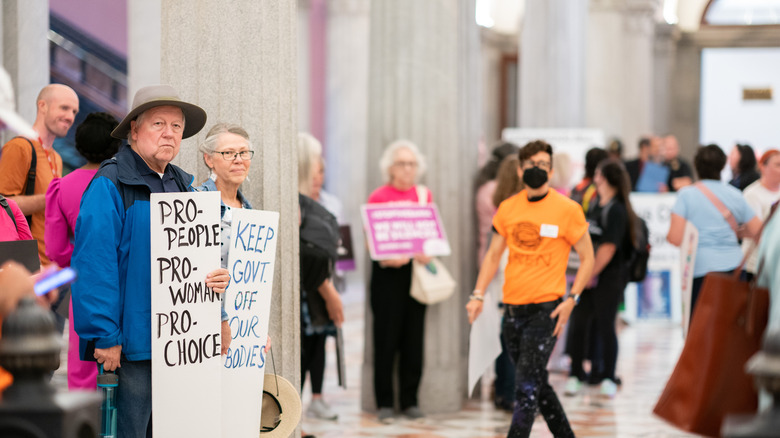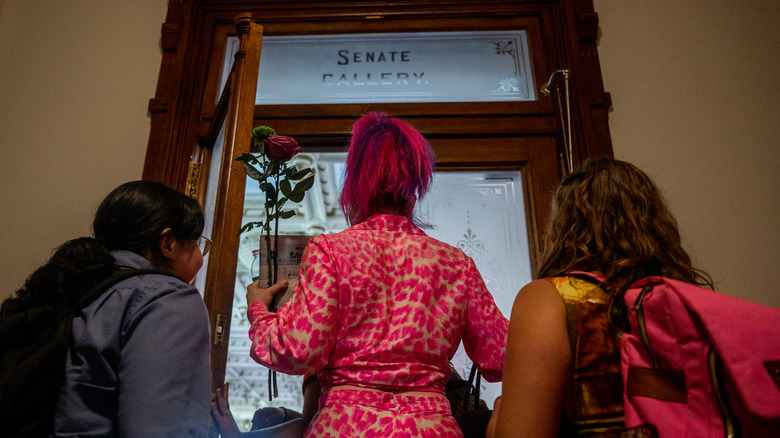Where Abortion Bans Currently Stand Across The US
With almost constant legislative votes and judicial rulings, it can be challenging to track the current state of abortion in the U.S. After nearly 50 years, the overturning of Roe v. Wade in 2022 led to a rush of trigger laws, state decisions, and subsequent legislation that changed the face of reproductive care. For many, deciphering between the bans and restrictions can be confusing, especially with new laws happening in rapid succession.
An important distinction to understand is the difference between near-total bans and gestational limit bans (6-week, 12-week, etc,). Near-total bans refer to laws that restrict all abortion services (surgical and medical), at all stages of pregnancy, except in life-threatening cases. Gestational limit bans are restrictions on abortion services depending on how far along a pregnancy is. Many states also require multiple appointments, tests, and hurdles within those weeks in order to receive abortion services.
In the past several months many states that previously had 15, 18, or even 20-week gestational limit bans have worked to change their laws to near-total or 6-week bans. Additionally, as more states reduce the time a person has to receive abortion services it is important to note that, at six weeks, most people do not know they are even pregnant yet. So, while a state can avoid a "near-total ban" label and even skirt around legal challenges the end result is the same for the residents of these states: they can not receive abortion services if and when they need them.
States with abortion bans and restrictions
Half of U.S. states are expected to attempt bans and limits on abortion. So far, 20 are currently restricting access with 12 states implementing near-total bans on all abortion services. Many of these bans do not include exceptions for rape or incest. While this is bad enough, some are also restricting a person's ability to receive abortion care out-of-state. Both Oklahoma and Texas have laws that allow for lawsuits against those who help someone attain an abortion. Idaho created a new felony ("abortion trafficking") that criminalizes helping a minor receive abortion services without parental consent. This means that family and friends who travel with minors for out-of-state abortion services or assist in medical abortion access (through the mail) could face two-to-five years in prison.
Georgia and North Dakota currently have six-week bans in place (Florida and South Carolina also passed six-week ban bills but they have yet to go into effect), while additional states currently have gestational limit bans ranging from 12 to 22 weeks. Among these gestational limit ban states, there has been considerable legislation shifting their laws to be more restrictive – North Carolina put a 20-week ban into effect after Roe v. Wade was overturned but will shift to a 12-week ban in July. Notably, while many of these states might still technically allow abortion services with gestational limits, some have made it nearly impossible for abortion clinics to operate through increasingly difficult laws, regulations, and requirements for providers.
States with blocked and mixed abortion restrictions
Despite trigger laws and legislative attempts, there are states who faced (and continue to face) judicial hurdles with abortion laws. Seven states currently face blocks on their bans or a mixed-ban status while they battle in court. Four states (Indiana, Ohio, South Carolina, Wyoming) have had their abortion bans blocked, however, that hasn't stopped them from trying new laws and/or implementing different restrictions.
Judicially blocking these laws can be helpful in the present, but it is not always a long-term guarantee of abortion rights. For instance, Wyoming's initial near-total abortion ban trigger law was indefinitely blocked by a judge, but their legislators brought forward two additional laws, one being another abortion ban and one being a specific ban on abortion pills. These laws currently face temporary blocks. Also, the South Carolina Supreme Court struck down and blocked the state's first six-week abortion ban attempt as unconstitutional back in January, making their recent re-attempt a chilling sign of how relentless the anti-choice movement continues to be.
The three states with mixed-ban status (Arizona, North Dakota, and Utah) each had bans blocked by judges but have been able to circumvent the process by implementing other bans in their place. These states are still actively restricting abortion services while they await the appeals process on more restrictive abortion bans. Abortion bans are and will continue to be in flux as individual states and politicians continue to move forward with their (unfortunately for many) more conservative legislation.


